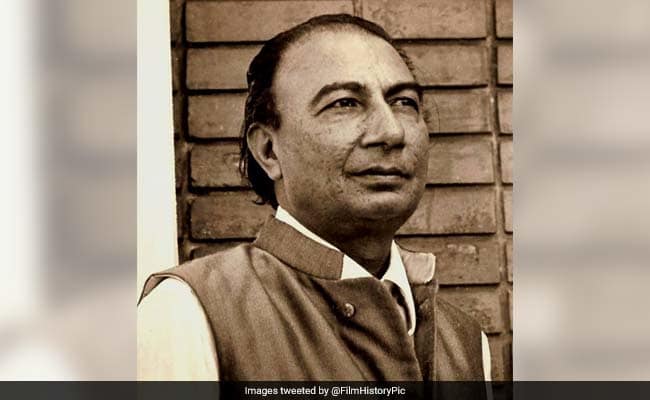‘Khuda-e-Bartar teri zameen par zameen ki khatir yeh jung kyoon hai?
Har ek fatah-o-zafar ke daaman pe khoon-e-insaan ka rang kyon hai?
O Lord Almighty, on your land, why is this war raging to win a land?
Why has every conqueror’s victory always been tainted with stains of human blood?)
From lyrics of the film ‘ Taj Mahal(1963)

Even after more than half a century, this masterpiece is relevant to this day. It not only expresses anti- war sentiments but also asks disturbing questions to aggressive and relentless warmongers. This lyric is rated as one of the best lyrics of Sahir Ludhianvi. His writings on communal harmony, love and compassion, the differences between rich and poor and patriarchy in society are cited as popular quotations by many urdu and hindi critics even in modern times.
Brief history
Abdul Hayee ( 8 March 1921- 25 October 1980) – pen name Sahir Ludhianvi – is a famous poet in Hindi and Urdu. He was born in a Punjabi Muslim family in Karimpura, Ludhiana, Punjab. (en.m.wikipedia.org). Sahir mother Sardar Begum, left her husband and forfeited claim to financial assets. In 1934, his father sued unsuccessfully for the custody of his son. Sardar Begum required protection from his father and she suffered financial deprivation. His place of birth is marked with a plaque on the building’s arched entrance.
Sahir was educated at Khalsa high school and Government College, Ludhiana( there the auditorium is named after him). Since his student days, he was popular with his ‘ nazm and ghazals’ (Urdu poetry and speeches). In 1943, he went to Lahore and completed his work in Urdu’ Talkhiyaan’ ( Bitterness) which appeared in 1945. He edited Urdu magazine ‘Adab-e-Lateef’ , ‘Shahakaar’ ,’ Prithlari’ and ‘Savera’. He became a member of Progressive Writers’ Association. After a controversial statement promoting communism, a warrant was issued by the Government of Pakistan. In 1949 he fled from Lahore to Delhi and then to Mumbai (suburb- Andheri) where he lived with neighbors like Gulzar and Krishan Chander, urdu writers. In 1970s, he built his own bungalow and named it after one of his works ‘ Parchaiyaan’ (shadows). He lived till he died. Though he had love affairs with Sudha Malhotra (singer) and Amrita Pritam ( writer) , he never married.
Social problems in lyrics
For financial stability, he became a lyricist in hindi films. He wrote four songs in his debut film ‘ Azadi Ke Raah Par (1949) but both the film and songs went unnoticed. He gained recognition from the film ‘Naujavaan’ (1951). From then on, he worked with famous artists like Guru Dutt and produced some of the finest lyrics with socio- political message and moral values. His lyrics in Pyasaa, Bazzi, Naya Daur , Dharamputra, till his last film Trishul and Aas Paas.
Works
Sahir did not praise khuda(God), husn (beauty) or jaam(wine). He wrote bitterly about declining values of society, the poor and unemployed, the pathetic state of girls and women, joys and sorrows of life,etc. His works have been translated into English by K. A. Abbas ‘ Shadows Speak ( Parchaiyaan) in 1958, Mahmood K.T(2000) ‘ Kalaam-i- sahir ludhiyanvi’, a collection of Ludhianvi’s poetry with English translation, Hassan R (1977) ‘A Bitter Harvest: selections from Sahir Ludhianvi’s verse, etc.
Awards
Sahir won filmfare award for his lyrics in the film ‘Taj Mahal'(1963) and again in 1976 for the film ‘Kabhie Kabhie’. He was awarded with ‘ Padma Shri’ in 1971. On March 8, 2013, a commemorative stamp was issued in his honour.
Poetic values
Sahir poems have immense social value and they reflect the declining human rights in the present society. In a poem ‘ Blood is but Blood’ he says,
‘ Repression is still repression
Rising, it must flop
Blood is still blood
Spilling, it must clot
Whether it clots on desert sands
Or upon assassin’s hands
On justice’s head or around shackled feet
On injustice’s sword or on the wounded corpse
Blood is still blood
Spilling, it must clot .
…….
…….
(PoemHunter.com) .
One of his famous lyrics is ‘Taj Mahal’ : in this poem, he expresses how poor peoples love is undermined by Royal Love:
‘The Taj, mayhap, to you may seem, a mark of love supreme
You may hold this beauteous vale in great esteem :
Yet my love, meet me hence at some other place!
How odd for the poor folk to frequent royal resorts:
Tis strange that the amorous souls should tread the regal paths
Trodden once by mighty kings and their proud consorts.
Behind the facade of love my dear, you had better seen,
The marks of imperial might that herein lie screen’d
You who take delight in the tombs of kings deceased,
Should have seen the hutments dark where you and I did wean .
Countless men in this world must have loved and gone.
Who would say their loves weren’t truthful or strong?’ ….
…….
( Poemhunter.com)
Sahir was a great visionary. He yearned for a world where there would not be sorrow, or greed or betrayal of love or hanging people by the state and so on. In his nazm ( lyric) in a film ‘Phir Subah Hogi’ (1958) he ardently expressed:
……
” Jab amber jhoom ke nachega aur dharti nagme gayegi
Woh subah kabhi to ayegi …. Woh subah kabhi toe ayegi” …..
( When the sky dances with joy and the Earth sings beautiful lyrics
That dawn will certainly come! That morn will definitely come)
The writer from anywhere and everywhere is an ardent admirer of Sahir and his works along with lyricists like Gadar, Gulzar and Vangapandu Prasada Rao
Courtesy: Counter currents